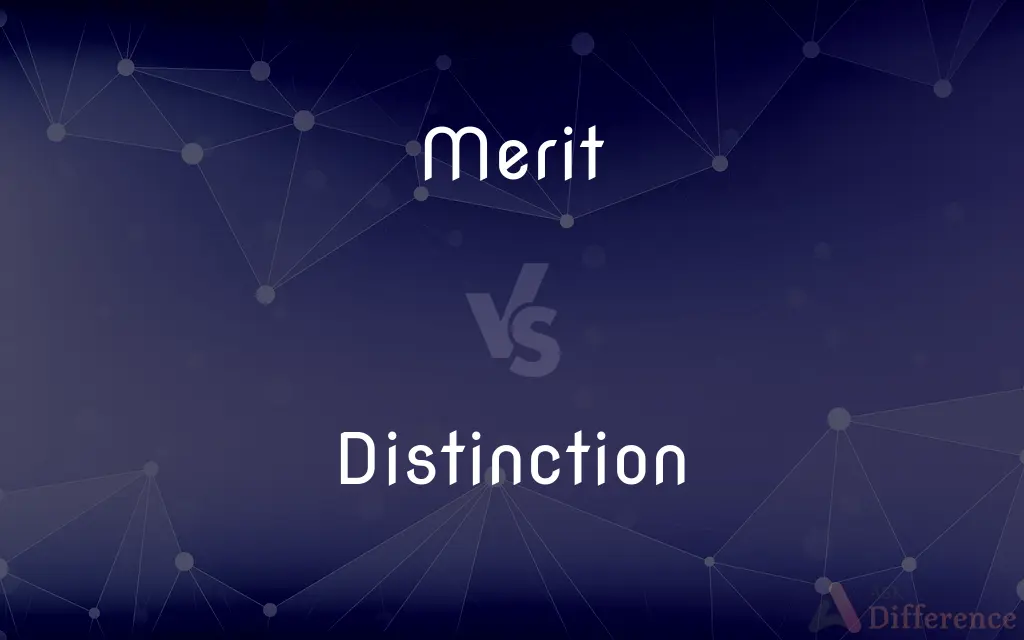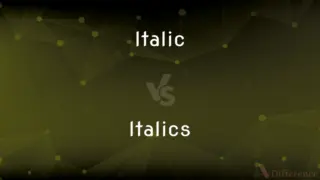Merit vs. Distinction — What's the Difference?
By Tayyaba Rehman — Updated on October 13, 2023
Merit refers to the quality of being good or worthy, while Distinction implies a notable difference or excellence.

Difference Between Merit and Distinction
Table of Contents
ADVERTISEMENT
Key Differences
Merit often denotes a positive quality or feature deserving praise, while Distinction refers to a marked difference or special honor.
In educational settings, Merit is a recognition of good performance; Distinction suggests an outstanding or superior performance.
When discussing character, a person with Merit has commendable traits; someone with Distinction stands out because of those traits.
In many reward systems, Merit might earn one a commendation; achieving Distinction is often a higher accolade.
Merit can often be achieved through hard work and dedication. On the other hand, Distinction typically requires one to go above and beyond, setting oneself apart from the rest.
ADVERTISEMENT
Comparison Chart
Definition
The quality of being particularly good or worthy.
A difference or contrast between similar things or people.
Associated with
Praiseworthiness, commendation.
Excellence, differentiation.
In Education
Acknowledgment for good performance.
Recognition for outstanding or superior performance.
Degree of Achievement
Achieved through consistent performance.
Achieved through exceptional performance.
Common Usage
"He received a merit badge."
"She graduated with distinction."
Compare with Definitions
Merit
Merit is the quality of being deserving.
His hard work had the merit of getting him a promotion.
Distinction
Distinction is a difference or contrast.
The distinction between the two brands is barely noticeable.
Merit
Merit means value or worth.
The merit of this plan is evident in its results.
Distinction
Distinction means a clear difference in quality or character.
There's a clear distinction in taste between the two wines.
Merit
Merit is a commendable achievement or act.
The student's research received merits at the conference.
Distinction
Distinction is a special honor or recognition.
He graduated with the highest distinction.
Merit
Superior quality or worth; excellence
A proposal of some merit.
An ill-advised plan without merit.
Distinction
The act of distinguishing; differentiation
Economists making an ongoing distinction between domestic and foreign markets.
Merit
A quality deserving praise or approval; virtue
A store having the merit of being open late.
Distinction
The condition or fact of being dissimilar or distinct; difference
"the crucial distinction between education and indoctrination" (A. Bartlett Giamatti).
Merit
Demonstrated ability or achievement
Promotions based on merit alone.
Distinction
A distinguishing factor, attribute, or characteristic
A legal system blind to distinctions of race, gender, and class.
Merit
Often merits An aspect of character or behavior deserving approval or disapproval
Judging people according to their merits.
Distinction
Excellence or eminence, as of performance, character, or reputation
A diplomat of distinction.
Merit
In various religions, spiritual credit granted for good works.
Distinction
A special quality or accomplishment conferring uniqueness or honor
Has the distinction of being the tallest in his class.
Merit
(Law) The factors to be considered in making a substantive decision in a case, independent of procedural or technical aspects
A trial on the merits.
Distinction
Recognition of achievement or superiority; honor
Graduated with distinction.
Merit
The factual content of a matter, apart from emotional, contextual, or formal considerations.
Distinction
An award or honor given to someone for outstanding achievement
Won many distinctions while in the military.
Merit
To earn; deserve.
Distinction
That which distinguishes; a single occurrence of a determining factor or feature, the fact of being divided; separation, discrimination.
Merit
To be worthy or deserving
Pupils are rewarded or corrected, as they merit.
Distinction
The act of distinguishing, discriminating; discrimination.
There is a distinction to be made between resting and slacking.
Merit
(countable) A claim to commendation or a reward.
Distinction
Specifically, a feature that causes someone or something to stand out as being better; a mark of honour, rank, eminence or excellence; being distinguished.
She had the distinction of meeting the Queen.
Merit
(countable) A mark or token of approbation or to recognize excellence.
For her good performance in the examination, her teacher gave her ten merits.
Distinction
A marking off by visible signs; separation into parts; division.
The distinction of tragedy into acts was not known.
Merit
Something deserving or worthy of positive recognition or reward.
His reward for his merit was a check for $50.
Distinction
The act of distinguishing or denoting the differences between objects, or the qualities by which one is known from others; exercise of discernment; discrimination.
To take away therefore that error, which confusion breedeth, distinction is requisite.
Merit
The sum of all the good deeds that a person does which determines the quality of the person's next state of existence and contributes to the person's growth towards enlightenment.
To acquire or make merit
Distinction
That which distinguishes one thing from another; distinguishing quality; sharply defined difference; as, the distinction between real and apparent good.
The distinction betwixt the animal kingdom and the inferior parts of matter.
Merit
Usually in the plural form the merits: the substantive rightness or wrongness of a legal argument, a lawsuit, etc., as opposed to technical matters such as the admissibility of evidence or points of legal procedure; (by extension) the overall good or bad quality, or rightness or wrongness, of some other thing.
Even though the plaintiff was ordered by the judge to pay some costs for not having followed the correct procedure, she won the case on the merits.
Distinction
Estimation of difference; regard to differences or distinguishing circumstance.
Maids, women, wives, without distinction, fall.
Merit
The quality or state of deserving retribution, whether reward or punishment.
Distinction
Conspicuous station; eminence; superiority; honorable estimation; as, a man of distinction.
Your country's own means of distinction and defense.
Merit
(transitive) To deserve, to earn.
Her performance merited wild applause.
Distinction
A discrimination between things as different and distinct;
It is necessary to make a distinction between love and infatuation
Merit
(intransitive) To be deserving or worthy.
They were punished as they merited.
Distinction
High status importance owing to marked superiority;
A scholar of great eminence
Merit
To reward.
Distinction
A distinguishing quality;
It has the distinction of being the cheapest restaurant in town
Merit
The quality or state of deserving well or ill; desert.
Here may men see how sin hath his merit.
Be it known, that we, the greatest, are misthoughtFor things that others do; and when we fall,We answer other's merits in our name.
Distinction
A distinguishing difference;
He learned the distinction between gold and lead
Merit
The quality or state of deserving well; worth; excellence.
Reputation is . . . oft got without merit, and lost without deserving.
To him the wit of Greece and Rome was known,And every author's merit, but his own.
Distinction
Distinction refers to excellence or superiority.
She is a writer of great distinction.
Merit
Reward deserved; any mark or token of excellence or approbation; as, his teacher gave him ten merits.
Those laurel groves, the merits of thy youth.
Distinction
Distinction is a classification or differentiation.
The distinction between right and wrong is crucial.
Merit
To earn by service or performance; to have a right to claim as reward; to deserve; sometimes, to deserve in a bad sense; as, to merit punishment.
Merit
To reward.
Merit
To acquire desert; to gain value; to receive benefit; to profit.
Merit
Any admirable quality or attribute;
Work of great merit
Merit
The quality of being deserving (e.g., deserving assistance);
There were many children whose deservingness he recognized and rewarded
Merit
Be worthy or deserving;
You deserve a promotion after all the hard work you have done
Merit
Merit refers to a praiseworthy quality.
Her honesty was a clear merit in her character.
Merit
Merit can be an advantage or beneficial feature.
The car has the merit of being fuel efficient.
Common Curiosities
Can someone be of Merit without achieving Distinction?
Yes, someone can have Merit for good qualities or performance without reaching the level of Distinction.
How is Distinction often used in education?
Distinction often refers to an outstanding or superior level of achievement.
How can Distinction relate to differences?
Distinction can indicate a difference or contrast between similar things or people.
In what scenarios is Distinction a positive term?
Distinction is positive when referring to excellence, special honors, or notable achievements.
Is every Distinction based on Merit?
Not necessarily. Distinction can also mean simply a difference or contrast without a value judgment.
What is the main difference between Merit and Distinction?
While Merit denotes praiseworthiness, Distinction suggests standing out or being notably excellent.
What does Merit primarily indicate?
Merit primarily indicates the quality of being good or deserving.
Does achieving Distinction always require Merit?
Generally, achieving Distinction implies having Merit, but the context matters.
Can Merit be used in the context of rewards?
Yes, Merit often refers to a reward or recognition for commendable acts or qualities.
Can a product or idea have Merit?
Yes, a product or idea can have Merit if it has commendable qualities or benefits.
How might one describe a student who earns both Merit and Distinction?
A student who earns both Merit and Distinction has both commendable qualities and stands out for their exceptional performance.
Can one have Merit in a negative context?
Typically, Merit is used in positive contexts, but it can be used ironically in negative contexts.
How does Distinction relate to differentiation?
Distinction can mean differentiation in terms of clearly setting something or someone apart from others.
Can both words be used in everyday language?
Yes, both Merit and Distinction can be used in everyday language to describe qualities, differences, or achievements.
Which term, Merit or Distinction, carries a stronger connotation of excellence?
Distinction typically carries a stronger connotation of excellence compared to Merit.
Share Your Discovery

Previous Comparison
Swamp vs. Marsh
Next Comparison
Italic vs. ItalicsAuthor Spotlight
Written by
Tayyaba RehmanTayyaba Rehman is a distinguished writer, currently serving as a primary contributor to askdifference.com. As a researcher in semantics and etymology, Tayyaba's passion for the complexity of languages and their distinctions has found a perfect home on the platform. Tayyaba delves into the intricacies of language, distinguishing between commonly confused words and phrases, thereby providing clarity for readers worldwide.














































